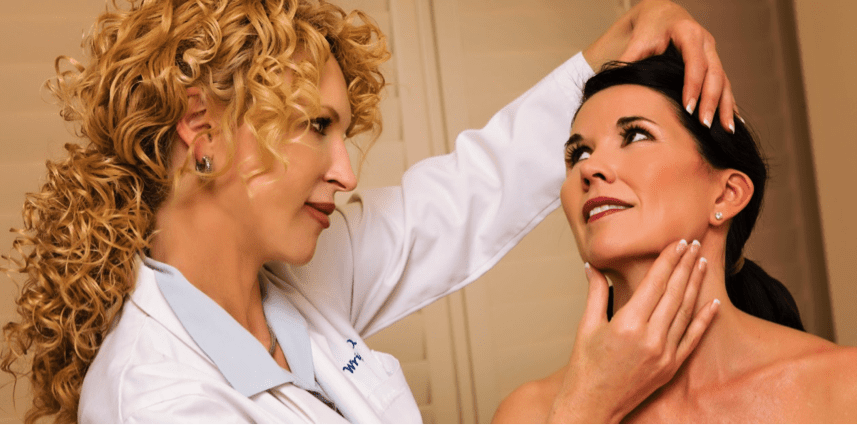Many patients tell us that they have “sensitive skin” when in fact, what they are really suffering from is a case of “sensitized skin”. Although the behaviors of these two conditions can present the same, there are some unique and crucial differences between the two.
Sensitive Skin is an inherited genetic trait, meaning you were born with it. It is a specific skin type that cannot be biologically changed. Steps can be taken to make your skin less sensitive – but general strategies will always be required to keep your complexion as calm as it can be.
Sensitized Skin is far more common and it is acquired through lifestyle choices that have made the skin more sensitive. It is not a skin type, but a skin condition that all skin types (dry, oily, normal) can be affected by. By removing the triggers and making better lifestyle choices, your complexion can return to its normal state as it is not a permanent condition.
Both skin “states” are similar in that the protective mantle of the Stratum Corneum (the outermost layer of skin) has been thinned out or damaged. When this protective barrier (epidermal lipid barrier layer) has been compromised micro cracks in the skin appear which allows for our valuable water content to evaporate quickly and allows unwanted pollutants, irritants and microorganisms to enter into the deeper layers of our skin. When this happens the typical signs are dry, flaky, cracked, irritated, itchy or uncomfortable skin.
What are the Skin Symptoms of Sensitive and Sensitized Skin?
Both conditions present the same, as both are a result of a compromised/damaged epidermal lipid barrier. The difference is that with sensitized skin, these symptoms go away once the skin has repaired itself and with naturally sensitive skin, these symptoms are often ongoing The most common finding are:
- Tingling, stinging, prickling, or burning
- Hot or warm
- Red and blotchy
- Blushing or flushing
- Dry, tight, flaky, or itchy
- Dry patches, cracked skin
- Spots and Bumps
- Sensitive to touch
- React quickly to heat (sun, hot water, high temperatures)
- Easily irritated to products or changes
Features of Sensitive Skin
- True sensitive skin is most common in people with fair/transparent skin (Celtic, Scottish, Irish decent) and have light eyes and light/red hair. Darker skin tones can have sensitive skin, but the incidence is not very common.
- The skin usually has less pigment, a thinner epidermis, and blood vessels are located close to the surface.
- Many people may also suffer with allergies and asthma and the skin condition eczema. To learn more about eczema click here.
Features of Sensitized Skin
- Skin can become sensitized by lifestyle choices and triggers. Excessive exfoliation, harsh topical ingredients (alcohol, lanolin, fragrances, and D&C colorants), strong sun exposure, extremes of hot and cold, smoking, poor diet and stress can all contribute to skin sensitization.
- Some factors that may not be personally changed that can create sensitized skin are environmental/air pollutants, age, hormonal changes, poor health, and climate.
- Once you have identified your triggers, with avoidance, skin can return to a normal healthy state.
How do you Treat Sensitive and Sensitized Skin?
Before using any cosmetic product, it is important to test it first on a small area to determine how your skin will react. Apply a small amount on the inner arm or behind your ear and wait 24 hours to observe for any adverse reaction. Dr. Wright has formulated complete skincare lines for sensitive and sensitized skin. To learn more click on www.RxBeautyBar.com.

To restore your skin to a healthy state, several steps need to be taken;
- Remove any known triggers (topicals, perfumes, smoking, food triggers)
- Choose a healthy lifestyle for you and your skin by exercising and decreasing stress
- Avoid sun exposure and use a sunscreen with minimal chemicals in it
- Avoid extreme weather climates ( too hot, too cold)
- Avoid diet fads, low fat diets, excess caffeine and alcohol as these will deplete the lipid level in your skin
- When choosing appropriate skincare your focus should be to restore hydration and strengthening the epidermal-lipid barrier. Read on and learn more about how
Fiona WRxIGHT MD Skincare can help you today!
Cleansers /Toners
Avoid hot water when washing and use a tepid temperature. Cleanser should be extremely gentle, sulfate free, gluten free and non-alkaline. Cleanser can be in a non-stripping gel or cream form that is formulated to fortify the protective barrier without leaving a heavy residue. If you use a toner, make sure it has no alcohol and applying with a spritzer spray rather than rubbing the face with a cotton ball or pad. In our Fiona WRxIGHT MD skincare line, we recommend;
Purifying Cleansing Mousse (for oily/acneic skin)
Zinc Aid Toner (for oily/acneic skin- certified organic)
Moisturizers / Antiaging
Effective moisturizers are essential to repair and calm sensitive/sensitized skin. Dry skin is more vulnerable to sensitivity, since the less moisture your skin retains; the weaker the cellular barrier and the more irritants can penetrate. Appropriate moisturizers should offer deep humectant hydration as well as provide a substantial layer of lipid barrier protection
Vitamin A-derived skin care still remains the gold standard in anti-wrinkle ingredients but it is also notorious for causing redness, dryness, and flakiness, no matter your skin type. For those willing to risk a little Vitamin A, choose product that contain retinaldehyde, retinol and retinyl palmitate. These ingredients have shown to help increase collagen production and with less skin irritation. Dr. Wright also recommends finding skin care lines that have incorporated additional ingredients to counteract the inflammation such as Avocado oil, Argan oil, Aloe and Green Tea.
If your skin is really sensitive, choose products containing peptides as they consist of multiple amino acids that help boost collagen production and thus decrease the appearance of lines—and they usually cause no irritation whatsoever. Creams that combine peptides with antioxidants such as Co-Q10 and Vitamin C are even better, since they may also help halt the breakdown of collagen.
Rehydration Complex with Vitamin C
Pure Hydrating Serum
Replenishing Marine Moisturizer
Advanced Renewal Serum (certified organic)
Sunscreens
Dr. Wright never tires in telling her patients to use daily sunscreen and this is especially true for sensitive/sensitized skin – as inadequate UV protection is well known to trigger inflammation. However, many sunscreens can add to the irritation, and if you tend to get red or itchy after applying sunscreen, switch to a chemical-free, broad-spectrum formula that uses a natural ingredient, such as zinc oxide or titanium dioxide.
Matte Finish Oil and Chemical Free SPF 30
Sun Shield SPF 30 (certified organic)
Specialty Treatments
Many people with sensitive or sensitized skin can also suffer with other skin ailments such as hyperpigmentation, dullness and aging texture – and are looking for products to help.
Pigmentation
To remove pigmentation, hydroquinone is the most effective ingredient available, but it is also potentially irritating. Instead look for products with natural acids like arbutin and bearberry to gently alleviate hyperpigmentation. Dr. Wright’s Complexion Perfection Lotion is specially formulated to balance skin tone and fade discoloration. This lotion contains a blend of botanical ingredients such as Kojic Acid, Arbutin and Bearberry Extract to lighten while Sodium Hyaluronate, Indian Gooseberry Extract will soothe and calm the skin and Vitamin E and C protects the skin from damage from environmental pollutants. Our Complexion Correction Lotion is hydroquinone free, alcohol-free, acetone-free, and best suited for patients with hyperpigmentation, melasma or other pigmentation issues including acne scarring.
Exfoliation
As harsh as they may be on skin, alpha and beta hydroxy acids and glycolic acid are still some of the best smoothing ingredients around. They help remove dead skin cells, which make your skin look dull and can act as a barrier to the skin-improving products you’re using. Those with sensitive skin can still use acids, but Dr. Wright recommends using a low percentage (3-4%) glycolic product like our Deep Cleansing Mask with 3% glycolic, or if you want to try a higher concentration, the product should have additional calming agents in it. Dr. Wright’s 10% and 15% Glycolic Refining Serums offer a higher level of glycolic as she expertly blended Aloe Vera into the formulation to offer additional soothing properties for the skin. Dr. Wright still recommends testing the waters by using her Facial Serums for only a few nights a week after you wash your face—and monitor for any irritation.
Masques
Masques are especially helpful for sensitive and sensitized skin, as the prolonged contact of a calming relief masque will delivers lasting effects to the skin. Typically, an appropriate masque of this type may be applied to spot-areas, or to the entire face, either for flare-ups as emergency relief, or for regular therapeutic use. In our Fiona WRxIGHT MD Skincare line we recommend our:
B5 Boosting Mask (certified organic)
Artic Mineral Mask (certified organic)

